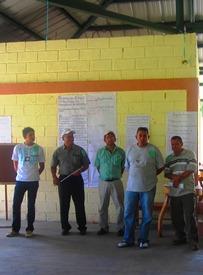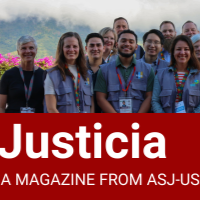To address such problems, in 2004 the Honduran Congress, aided by a team of ASJ lawyers, drafted a new law allowing the government to take over (or to use the legal term, “expropriate”) neighborhoods where multiple people had filed conflicting ownership claims. Once expropriated, residents can pay into a trust fund overseen by the government and receive indisputably valid land titles. Competing claims to ownership of the once-bare, now-populated field or mountainside are sorted out in court, and if any are found to be legitimate, the owners are compensated for their loss with money the current residents paid into the trust fund.
A title provides emotional and financial security for poor Honduran homeowners. With a title, they know that no one can take their land away from them, because they have legal proof of ownership. Land is often a poor family’s most valuable asset; a title “unlocks” this asset, allowing it to be used as collateral on a loan to start a small business or to do home improvements.
In 2005, Luis Enrique was excited. The government had just expropriated his neighborhood, Villa Linda—titles were sure to follow soon. But things quickly went sour. In an election-season rush, the government expropriated scores of neighborhoods without doing the requisite research beforehand. In Luis Enrique’s community, there were not competing claims to ownership—just one legitimate owner, a bank called Banhprovi, which had already proven that Luis Enrique and his neighbors had moved onto its land without permission. Now the bank wanted them to pay it directly, instead of going through the roundabout trust-fund process. The courts sided with the bank, leaving the neighborhood in a legal catch-22.
The new law didn’t provide any way for neighborhood residents to appeal court decisions, but it did stipulate that neighborhood residents could not start any other land ownership process, for example, by paying the owner directly, since the neighborhood had already been taken over by the government. As ASJ Land Rights educator Anajansi puts it, “The community was completely paralyzed.”
The ASJ Land Rights team had already been working with Luis Enrique’s neighborhood, and 9 others with the same problem, since the government had taken over their land, training groups of citizens in “Land Rights Committees” to advocate for their communities as they work towards land ownership. Josie, a lawyer on the team, also accompanied neighborhood members to meetings with government officials and helped them to read complicated legal documents about their situation.
In addition, the plight of these neighborhoods was one of ten points for change that the Land Rights team repeatedly pushed with officials at the Property Institute (the government agency overseeing land titling). As Josie says, “Whenever we would have a meeting, we asked what was happening with these neighborhoods and how the Property Institute was going to respond. We kept reminding them that these neighborhoods had nowhere to turn.”
In February 2012, as if in answer to Luis’ letter, and the team’s pressure, the President issued a decree that overrules the court orders that had brought the titling process to a standstill in Luis’ neighborhood and 9 others; the bank would still get paid, it would just have to go through the process outlined in the law. Josie stresses how important this decree is, saying, “They’ll have legal security for their land. Now they’ll be able to get a title when before they were hopeless.”
It would have been nearly impossible for the communities to advocate for themselves, says Josie, without the support of the Land Rights team. “They have to wade through so much legal jargon and visit so many government offices, it would have been difficult for them to understand their situation on their own,” she says.
But, with the support of the Land Rights staff people like Luis Enrique were able to make their voices heard so that he, along with 160 other families in his neighborhood, and residents of 9 other neighborhoods will be able to obtain their land titles and the security that they provide.
















